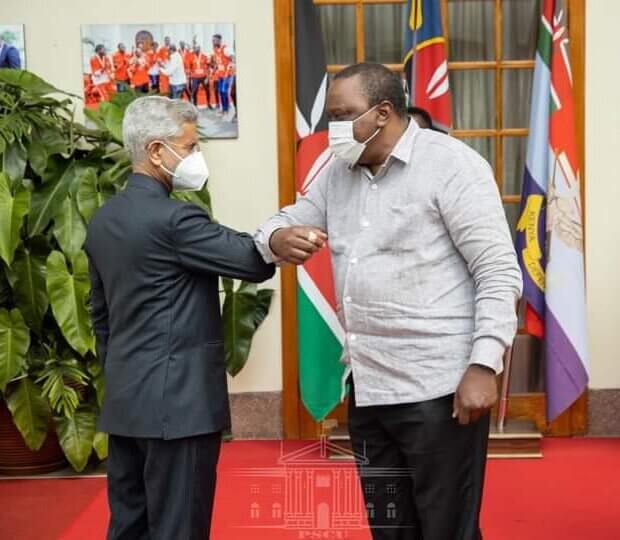Indian External Affairs Minister S. Jaishankar concluded his three-day visit to Kenya on Monday. During his trip, he met with President Uhuru Kenyatta, held a roundtable conference with a number of Kenyan cabinet ministers, and talked with members of the Indian diaspora in the country.
On Monday, he attended the opening ceremony for the refurbished Mahatma Gandhi Library at the University of Nairobi. At the event, he delivered a speech that focused on the changing nature of global challenges and the need for greater collaboration between India and Africa through what he described as ‘decentralised globalisation’.
He said, “Our sense of security has also undergone a radical change. We now perceive health and food security as more intrinsic to national security.” He added, “This makes a compelling case for enhancing capacities in Africa and that would only happen with partnerships genuinely aimed at Africa’s welfare, to deliver more extensively on development projects. Indeed, the development itself will only unfold when it is based on deeper capacities.”
Jaishankar remarked that the pandemic has underscored the “dangers of relying on limited geographies,” saying, “When supply chains were disrupted, and demand outstripped supply, the more vulnerable were inevitably short-changed.”
Along these same lines, following a meeting with Kenyan Secretary for Cabinet Affairs Raychelle Omamo, the Kenyan minister said, “The two sides have reaffirmed their commitment to a rules-based multilateral system and underlined the important role of the United Nations in addressing global challenges.” During his meeting with Omamo, the two sides also discussed launching joint ventures in the pharmaceutical industry to “make affordable drugs more easily available.” Omamo and Jaishankar also stressed on the “need for equitable and affordable access to vaccines and ensuring treatment to all.”
His meetings with President Kenyatta and cabinet ministers focused largely on security in the Indo-Pacific and the Horn of Africa. Following the ministerial roundtable meeting, India and Kenya released a joint statement expressing their “concern at the growing radicalisation and the increase in international terrorism and violent extremism in parts of Africa and Asia.”
The statement went on to say: “As maritime neighbours, India and Kenya recognised the importance of ensuring through shared endeavours greater security, safety, and prosperity of the Indian Ocean Region in mutual interest.” The meeting was attended by Foreign Minister Omamo, Defence Minister Monica Juma, Trade and Industry Minister Betty Maina, Information and Communication Technology Minister Joe Mucheru, Energy Minister Charles Keter, Assistant Treasury Minister Nelson Gaichuhie, Assistant Health minister Rashid Abdi Aman, and Interior Secretary Karanja Kibicho.
On Sunday, Jaishankar also held an online interaction with Indian diaspora. It is estimated that there are 80,000 people of Indian origin in Kenya, including around 20,000 Indian citizens. The meeting was moderated by Indian High Commissioner Dr. Virander Paul.
Both countries are currently members of the United Nations Security Council (UNSC) and Jaishankar’s trip was used to bolster military and maritime cooperation between the two countries. In fact, in order to counter-balance China’s growing presence in the Indian Ocean Region, India has sought to bolster naval and security ties with littoral states in the region, particularly with Mauritius, Seychelles, Madagascar, and Comoros.
India is also looking to establish a presence at ‘maritime chokepoints’ in the Indian Ocean such as the Strait of Hormuz, Bab-el-Mandeb, and the Mozambique Channel. To this end, it has sought to transfer naval hardware, offer logistical support, share intelligence, and hold joint exercises with countries in the area. It has also expanded military aid, capacity building operations, and its participation in peacekeeping training and counterterrorism operations.
During this pandemic, India has sought to further strengthen these ties through its vaccine diplomacy and has committed to supply the African continent with 10 million doses of COVID-19 vaccines.
Indian EAM Jaishankar Highlights Need for ‘Decentralised Globalisation’ During Kenya Trip
Both countries are currently members of the United Nations Security Council (UNSC) and Jaishankar’s trip was used to bolster military and maritime cooperation between the two countries.
June 16, 2021

IMAGE SOURCE: STATE HOUSE NIGERIAIndian External Affairs Minister Subrahmanyam Jaishankar (L) and Kenyan President Uhuru Kenyatta
